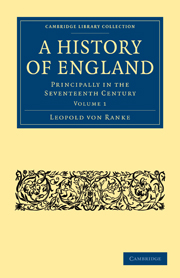Book contents
- Frontmatter
- PREFACE
- TRANSLATORS' PREFACE
- Contents
- BOOK I THE CHIEF CRISES IN THE EARLIER HISTORY OF ENGLAND
- BOOK II ATTEMPTS TO CONSOLIDATE THE KINGDOM INDEPENDENTLY IN ITS TEMPORAL AND SPIRITUAL RELATIONS
- BOOK III QUEEN ELIZABETH. CLOSE CONNEXION OF ENGLISH AND SCOTTISH AFFAIRS
- BOOK IV FOUNDATION OF THE KINGDOM OF GREAT BRITAIN. FIRST DISTURBANCES UNDER THE STUARTS
- INTRODUCTION
- CHAP. I James VI of Scotland: his accession to the throne of England
- CHAP. II First measures of the new reign
- CHAP. III The Gunpowder Plot and its consequences
- CHAP. IV Foreign policy of the next ten years
- CHAP. V Parliaments of 1610 and 1614
- CHAP. VI Survey of the literature of the epoch
- BOOK V DISPUTES WITH PARLIAMENT DURING THE LATER YEARS OF THE REIGN OF JAMES I AND THE EARLIER YEARS OF THE REIGN OF CHARLES I
CHAP. VI - Survey of the literature of the epoch
Published online by Cambridge University Press: 07 June 2011
- Frontmatter
- PREFACE
- TRANSLATORS' PREFACE
- Contents
- BOOK I THE CHIEF CRISES IN THE EARLIER HISTORY OF ENGLAND
- BOOK II ATTEMPTS TO CONSOLIDATE THE KINGDOM INDEPENDENTLY IN ITS TEMPORAL AND SPIRITUAL RELATIONS
- BOOK III QUEEN ELIZABETH. CLOSE CONNEXION OF ENGLISH AND SCOTTISH AFFAIRS
- BOOK IV FOUNDATION OF THE KINGDOM OF GREAT BRITAIN. FIRST DISTURBANCES UNDER THE STUARTS
- INTRODUCTION
- CHAP. I James VI of Scotland: his accession to the throne of England
- CHAP. II First measures of the new reign
- CHAP. III The Gunpowder Plot and its consequences
- CHAP. IV Foreign policy of the next ten years
- CHAP. V Parliaments of 1610 and 1614
- CHAP. VI Survey of the literature of the epoch
- BOOK V DISPUTES WITH PARLIAMENT DURING THE LATER YEARS OF THE REIGN OF JAMES I AND THE EARLIER YEARS OF THE REIGN OF CHARLES I
Summary
The times in which great political struggles are actually going on are not the most favourable for production in the fields of literature and art. These flourish best in the preceding or following ages, during which the impulse attending those movements begins or continues to be felt. Just such an epoch was the period of thirty or forty years between the defeat of the Armada and the outbreak of the Parliamentary troubles, a period comprising the later years of Queen Elizabeth and the earlier years of King James I. This was the epoch in which the English nation attained to a position of influence on the world at large, and in which at the same time those far-reaching differences about the most important questions of the inner life of the nation arose. The antagonism of ideas which stirred men's minds generally could not but reproduce itself in literature. But we also see other grand products of the age far transcending the limits of the present struggle. Our survey of the history will gain in completeness if we cast even but a transient glance, first at the former and then at the latter class of these products.
In Scotland the studies connected with classical antiquity were prosecuted with as much zeal as anywhere else in Europe; not however in order to imitate its forms in the native idiom, which no one at that time even in Germany thought of doing, but in order to use it in learned theological controversies, and to maintain connexion with brother Protestants of other tongues.
- Type
- Chapter
- Information
- A History of EnglandPrincipally in the Seventeenth Century, pp. 450 - 464Publisher: Cambridge University PressPrint publication year: 2010First published in: 1875



